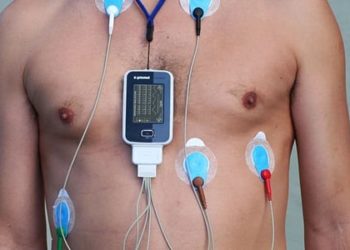Artificial intelligence algorithm may increase atrial fibrillation detection rate in ambulatory setting
1. The detection rates for newly diagnosed atrial fibrillation were almost five times greater between high-risk patients compared to low-risk patients.
2. Screening with artificial intelligence was associated with a significantly increased detection compared to usual care.
Evidence Rating Level: 1 (Excellent)
Study Rundown: Atrial fibrillation (AF) is a common type of arrhythmia leading to an irregular and rapid heart rate. This study evaluated the use of an artificial intelligence (AI) algorithm as a screening tool for AF in patients with risk factors for stroke. The electrocardiogram (ECG) was analyzed using the AI algorithm and assigned an AF risk score. Patients were then required to wear a continuous heart rhythm monitor for 30 days. The study found that AF was detected in significantly fewer low risk patients than high risk patients. A total of 7.6% of patients in the high-risk group had newly diagnosed AF on the continuous cardiac monitoring. This trend was similar for longer runs of AF, and additionally there was greater AF burden associated with those who were high risk. Limitations of this study include the inability to control for other variables, including socioeconomic status and other factors that may affect the rate of undiagnosed AF. Nonetheless, this study proposes a new innovative option for the screening of AF.
Click to read the study in The Lancet
Relevant Reading: Opportunistic screening versus usual care for detection of atrial fibrillation in primary care: cluster randomised controlled trial
In-Depth [randomized controlled trial]: This study used ECG data from patients aged 18 years or older for any indication at the Mayo Clinic site. The algorithm assigned a risk score of 0-1 with 1 being the highest risk of unrecognized AF. Patients were eligible if they had no prior history of AF and if AF was identified, would be potential candidates for anticoagulation based on CHA2DS2-VASc scores. Exclusion criteria included anticoagulation for any other indication. The cut-off for high risk was an AI score of 0.11, as defined by a prior study. Patients enrolled (n = 1003) underwent continuous ambulatory heart rhythm monitoring for 30 days and the data was continually overviewed by an ECG technician. The primary outcome for the study was a newly diagnosed atrial fibrillation, defined as > 30 seconds or longer and detected during the continuous monitoring period. The median age of study participants was 74.0 years and 38.2% were women. Devices were worn for 83.0% of the protocol monitoring time. A total of 54 patients met the criteria of newly diagnosed AF on cardiac monitoring, of which 48 (7.5%) of 633 were high risk and 6 (1.6%) of 370 were low risk (OR 4.98, 95% CI 2.11-11.75, p=0.0002). This trend was similar for those who had AF lasting 6 minutes or longer or lasting 24 h or longer. Associated AF burden was also higher in those that were high risk. AI-guided screening was associated with significantly higher rate of detection (high-risk group: 3.6% with usual care versus 10.6% with AI-guided screening, p<0.0001).
Image: PD
©2022 2 Minute Medicine, Inc. All rights reserved. No works may be reproduced without expressed written consent from 2 Minute Medicine, Inc. Inquire about licensing here. No article should be construed as medical advice and is not intended as such by the authors or by 2 Minute Medicine, Inc.







